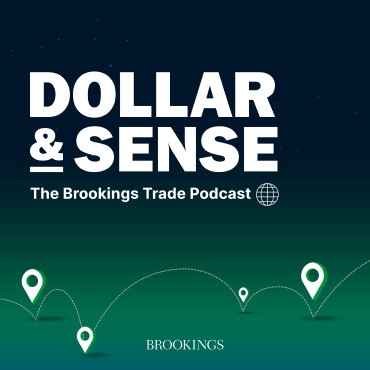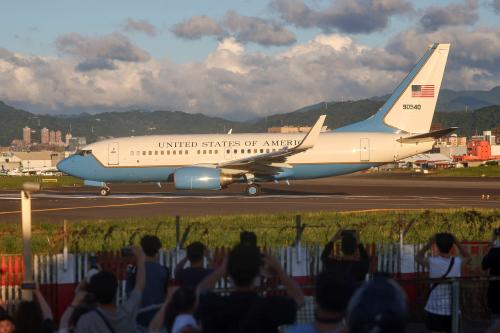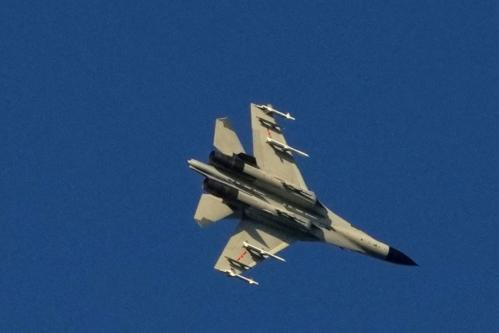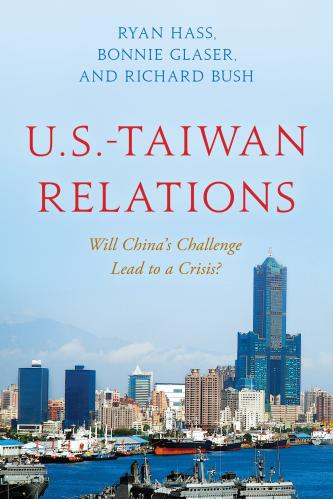Brookings Senior Fellows Richard Bush and Ryan Hass, co-authors with Bonnie Glaser of a new Brookings Press book on U.S.-Taiwan relations in the context of China’s challenge, argue that tensions between the PRC and Taiwan can only be resolved with the assent of Taiwan’s people. Taiwan’s presidential election result in 2024 will also affect how much pressure Beijing applies to cross-Taiwan Strait relations, they explain.
- Listen to Dollar & Sense on Apple, Spotify, Google, or wherever you like to get podcasts.
- Learn about other Brookings podcasts from the Brookings Podcast Network.
- Sign up for the podcasts newsletter for occasional updates on featured episodes and new shows.
- Send feedback email to [email protected].
TRANSCRIPT
[music]
DOLLAR: Hi, I’m David Dollar, host of the Brookings trade podcast Dollar and Sense. Today, we are going to talk about Taiwan. In particular, a new book from Brookings Press called U.S. Taiwan Relations: Will China’s Challenge Lead to a Crisis? This book was written by Bonnie Glaser, who’s the head of the German Marshall Fund’s China program, and two Brookings senior fellows who have deep experience in Taiwan, Richard Bush and Ryan Haas. So, I’m fortunate to have Richard and Ryan with me today. So, Richard, welcome to the show.
BUSH: Thank you. It’s nice to be here.
DOLLAR: And Ryan, welcome to you as well.
HASS: Thank you, David.
DOLLAR: So, Richard, let’s start with you. I think there’s often a lot of confusion about the official U.S. position on Taiwan, which in my view hasn’t really changed much between Republican and Democratic administrations going back quite a few decades. So could you succinctly tell us, what is the U.S. official position on Taiwan? And also, do our key allies in Europe and Japan have the same view, or is there some daylight among us?
BUSH: Well, okay, we need a little bit of history here. After the Chinese civil war ended in 1949, the world was left with two Chinese governments. The winner was the People’s Republic of China, which controls the mainland of China. And the loser was the Republic of China, which controls Taiwan. And these two governments contended relentlessly for international recognition, and each insisted that other countries like the United States had to choose either one or the other—we couldn’t have two Chinas. So, in 1978 and 1979, the United States decided for strategic reasons that it had to end its past relationship with the Republic of China and shift to the People’s Republic of China.
So, we recognized the People’s Republic of China government as the government of China. We ended diplomatic relations with the Republic of China government on Taiwan. We ended the defense treaty with the ROC. We pledged that we would have unofficial relations with Taiwan, and that is a key aspect of the current tensions.
But we only acknowledged the Chinese view that the territory of Taiwan was part of China’s sovereign territory. These are the basics of our Taiwan policy. They go back to 1979.
But there’s one more important one, and that is what’s our view on how this dispute between the PRC and the ROC should be resolved. First of all, it’s the U.S. position that this should be resolved by the two parties themselves. Second, it should be resolved peacefully. And third, that it should be resolved with the assent of the people of Taiwan. And that’s a recognition of the fact that Taiwan has a democratic system.
DOLLAR: And what about our allies, our key allies in Europe and Asia, like Japan? Would you say their position is basically the same?
BUSH: Yes, their position is basically the same. They recognize the PRC as the government of China, but they’re ambiguous on the legal status of Taiwan.
DOLLAR: So, Ryan, let’s turn to you. You were the China director on the National Security Council at the end of the Obama administration. And since then, we’ve had Trump administration and Biden administration. Do you see continuity in the policies of these two recent administrations? And probably a more important question is does Beijing see continuity in the policies of these two administrations, or does Beijing have reason to think that we’ve changed our views?
HASS: Well, David, I think the honest truth is that both Washington and Beijing have shifted their approach to Taiwan in recent years. Both sides blame the other for this. And there really is sort of a tit-for-tat dynamic that is at play.
But your question really speaks to a broader issue of why Richard and Bonnie and I came together to write this book in the first place. We originally joined forces in spring 2021 to write a op-ed because we were alarmed by the growing chorus of voices in Washington that were making predictions about when China would use force to assert control over Taiwan. And we were concerned that hyping this threat projected a bit of American anxiety and insecurity, which risked playing into Beijing’s efforts to wear down the psychological confidence of the people of Taiwan in their own future and their democratic way of life.
And so we wrote this op-ed, we pitched it to every major news outlet in the United States and were rejected by all of them. Thankfully, National Public Radio gave us the opportunity to post there, which we did. But we got together for lunch afterwards to lick our wounds a bit from this experience. And we agreed that rather than commiserate amongst ourselves, we needed to do something about this troubling trend line. And so that was sort of the genesis of this book project.
And, to be honest, part of the work of the book is to shine an uncomfortable spotlight on some of the erosion and discipline that has taken place in U.S. policy toward Taiwan in recent years. There’s been an erosion both in discipline and, I would say, in precision about how we approach the Taiwan issue.
So, to answer your question, David, yes, I do think that U.S. policy has shifted somewhat in the past six years. And in fairness, I think that a lot of that has been in response to China’s increasing pressure on Taiwan. But part of the function of this is that the United States, I worry, is departing a bit from first principles in its approach to Taiwan, and Richard touched upon this a moment ago. I’ll just add a few others to that, which is that Taiwan is not a problem with an American solution. Neither side of the Taiwan Strait seeks our mediation or our imposition of a solution on them.
So, the real goal of U.S. policy is to preserve peace and stability in the Taiwan Strait. It is not the job of the United States to predetermine what resolutions are acceptable or unacceptable. The people of Taiwan have agency in defining and pursuing their interests. And ultimately, Taiwan is not a card to be played in a competition with China. Being for Taiwan is not a way to show toughness on China. And really, our belief is that friends don’t treat friends as strategic pawns.
So, if our book only accomplishes one thing, which is to raise awareness of some of these first principles for our approach to Taiwan, I will have considered it a success.
DOLLAR: So, both of you have emphasized the importance of the will of the people who live on Taiwan. So, I want to come back to Richard and ask, can we see an opinion polls what people in Taiwan want in terms of a resolution? Do they want reunification? Do they want formal independence? What do they think about some of these recent events like Nancy Pelosi’s visit to Taiwan or Speaker McCarthy meeting with Taiwan President Tsai Ing-wen in California recently?
BUSH: Thanks for that question, because I think that we should always keep in mind what Taiwan people think as we think about our policy towards Taiwan. And actually, there is a fair amount of consensus on a lot of issues. So, let’s take first how do Taiwan people identify themselves? Do they identify themselves as Taiwanese, or Chinese, or both? And remarkably, less than 4% say they are Chinese, 62% say they’re Taiwanese, and 31% say they’re both. The problem with this poll is that these terms are never defined, so you’re not clear what people are responding to.
However, this identification with Taiwan does not mean that people want to create an independent country that’s totally separate from China. In fact, 6.4% only believe that we should move for independence now. Another 22% say we should wait and see how things go and then probably go to independence. However, 60.4% believe that the status quo should be maintained, they like the status quo just fine. Only 7.1% are in favor of unification.
DOLLAR: Right. So, that’s really very striking.
BUSH: Let me go on and talk to how Taiwan people see their security situation and what would happen if in the unlikely event that they declared independence, what would happen? First of all, a vast majority of Taiwan people would be happy to be an independent country if it didn’t mean war. However, 65% of Taiwan people believe that if they did go independent, China would attack, and then the percentage of those who would favor Taiwan independence drops down.
So, Taiwan people are very pragmatic about their security situation. They don’t want to create circumstances that would destroy the good life that they have. They also believe that if they went independent and China attacked, the United States would probably not come to their aid. So, that’s another sobering factor and a contributor to this pragmatism.
Finally, China has a proposal called “one country-two systems.” If you asked Taiwan people would they accept unification under that, it’s at least 65% and probably more.
DOLLAR: So, Ryan, to come back to you, there’s an important presidential election coming up on Taiwan in January 2024, as I understand it. And I think, what Richard just said gives a good foundation for thinking about that. The current president, Tsai Ing-wen, is from the Democratic People’s Party and she cannot run for a third term. And that party’s candidate is William Lai, who I see as a bit of a firebrand in terms of pushing for independence. So, could you give us a little background on this election and what are some of the possible outcomes and what are the implications?
HASS: Sure. William Lai is the current vice president. And, I sort of start from the premise that William Lai is a smart and successful politician who wants to become president. And so, I expect that he’s going to organize his campaign in a way that maximizes his chances of being elected. And in practical terms, I think this means he’s going to need to demonstrate that he is a steady leader, like Tsai Ing-wen, who is capable of looking out for and protecting Taiwan’s long term interests.
And at the end of the day, as Richard just really helpfully illuminated, the Taiwan voters are deeply pragmatic. They privilege protecting the status quo. And while there are some who would like to throw caution to the wind and make a bolt for independence, and there are others who are open to unification, a significant majority of the Taiwan voters are in the middle, and those are the voters that William Lai needs to target and attract if he wants to win the election.
So, I think that William Lai’s job over the coming months is to demonstrate that he is capable of protecting the status quo. And even after the election, if he wins, the choice of whether to pursue de jure independence will not be in his hands alone. I think that any change to the status of Taiwan likely would require a constitutional amendment. And Taiwan’s threshold for amending its constitution is one of the highest of any entity in the world. And so, even if, you know, in his heart of hearts, William Lai has dreams along these lines, it’s still going to be prohibitively hard for him to realize them.
Now, of course, Beijing has its own views on this question, and they have made clear the depth of their suspicion about William Lai’s intentions. And they think that he is very committed to trying to push Taiwan further away from China. And so, if William Lai wins, I expect Beijing will likely look for ways to dial up pressure on Taiwan, both to show a domestic audience that they are taking the initiative on Taiwan, but also to try to deter a Lai administration from taking steps that they believe would further weaken the bonds across the Taiwan Strait.
So, that’s in a sense, David, how I have been looking at and thinking about the DPP side of this election.
BUSH: I think in line with what Ryan has said, the last thing that the United States government or any government for that matter should be doing is prejudging William Lai’s policies nine months before he may become president or a year before he may become president. Unfortunately, China seems to have already prejudged him, and that could prevent the possibility of coexistence between the two sides of the Taiwan Strait and a more peaceful situation than the one we see now.
DOLLAR: So, Richard, the other main party in Taiwan is the old Nationalist Party, Guomindang from Chiang Kai-shek days. And one of the former leaders of that party, who was former president of Taiwan, Ma Ying-jeou, was recently on mainland China, met some senior leaders. The message I read in the press is he came back with the view that his party means peace and the DPP means war. And obviously there’s some politics in that kind of formulation. But how do you see the Taiwan people reacting to his visit and his message?
BUSH: I think that former President Ma’s statement is a good campaign slogan, but it oversimplifies the situation. What China does depends very much on DPP policies. President Tsai has not challenged Beijing’s bottom line. As I said, we should not prejudge a President Lai would do.
There’s a good reason why China has not been able to convince Taiwan of its proposal on unification, and that’s because it’s a bad proposal. Beijing should look in the mirror to see the reason for the situation.
Now, you ask, how do Taiwan people respond to this rhetoric from former President Ma? I think that it merely reinforces existing divisions. KMT people will probably agree with what he says. DPP people will probably disagree. Independents will judge this prediction based on the circumstances and based on what they hear from the various candidates in the upcoming election.
The other factor here is the United States. We need to pursue a policy that Taiwan leaders are comfortable with. I think we all learned a lesson from the Pelosi trip and that the polls showed that a majority of Taiwan people felt less secure after Pelosi’s visit and the subsequent exercises by the PRC military than they did before. And I think that both the current Taiwan leadership and the Biden administration have taken that to heart.
DOLLAR: Yeah, I think that’s a very important point, that if Taiwan becomes a kind of political football in the United States that’s just not in the interests of the people of Taiwan.
Ryan, I’m going to come back to you and let’s talk a little bit about economics, this is the trade podcast, after all, but I interpret that that very widely. But Taiwan is a major trading partner for the United States. As a small entity, it’s actually a pretty big economic player. It’s got deep integration with the U.S., but it has even deeper integration with the mainland. So, can we talk about that a little bit? Is this sustainable for Taiwan to have this deep economic relationship with the mainland as these geostrategic tensions are heating up?
HASS: Well, David, I feel like I’m stepping a bit into your turf talking about these issues, so I’ll offer perspective but welcome yours as well. But before I do, I do want to just reinforce the point that Richard made about the fact that governments really should not prejudge what the outcome of the upcoming election will be and how the candidates for it would govern in the future.
And I take comfort because I think that our friends in the United States governments have largely heeded Richard’s advice. I think that they are not prejudging a Lai candidacy or KMT candidacy. I think their being open, objective, and trying to be balanced and nonpartisan. And I expect that that that’s where the United States will continue to be throughout this election.
Now, on your question, David, you’re absolutely right. I think that Taiwan is the 21st largest economy in the world and the eighth largest trading partner of the United States. And the question that you’re asking, I think, really cuts to the heart of the issue of whether the status quo in the Taiwan Strait is sustainable. Because your premise is correct that Taiwan trades more with China than it does with the United States. I think China accounts for around 23% of Taiwan’s overall trade, whereas the United States is around 13%.
And the Tsai administration has made efforts to try to diversify Taiwan’s trade and investment flows so that they’re not too heavily dependent upon and exposed to the China market for their future growth. And I think that they have made some progress in this regard, both through their new southbound policy to try to catalyze deeper trade and investment links with Southeast and South Asia, but also through government subsidies for reshoring some advanced manufacturing from China to Taiwan.
At the end of the day, though, my sense is that there are limits to this. Taiwan does not have the option of decoupling fully from China. And I don’t think that there would be support in Taiwan for doing so. I think that many people in Taiwan’s business community recognize that China is the second largest economy in the world, and that even as it’s growing at a slower rate, it’s growing from a bigger base. And, there will be some limits to future economic interaction between Taiwan and China, particularly in high tech sectors, where there are national security risks that implicate American as well as Taiwan’s security.
So, I expect that cross-strait economic ties will continue to be pretty deep going forward, but there may be a bit more guardedness and sort of circumscribing where trade may not be possible in the future relative to where we’ve been in past decades.
DOLLAR: Yeah, Ryan, I think that part of your joint book is really quite sensible. Collectively we’re going to be cutting off some of the technology trade between the U.S. and our partners like Taiwan, vis-à-vis the mainland. But a lot of trade is going to continue at a high level. And I think that that is in the interests of people, both in Taiwan, also the United States, also the mainland. So, as an economist, I hope we can maintain a lot of that basic trade.
So, listen, last question, I’d like to hear both of you weigh in on, because we do hear quite a bit of talk about the potential for war over Taiwan here in Washington. So, I want to just address head on, start with Richard, then come to Ryan, what are the risks of war? Can we speculate a little bit about would the U.S. likely send combat troops? And I guess, most importantly, what can we do to avoid war? Because my sense is this would be a real disaster.
BUSH: Well, this is the main reason we did this book, because we wanted to calm people down a little bit over the possibility of war. I actually think the risk of war is low. I think Taiwan leaders are very sensible. They have accommodated to the status quo preferences of the population. And so, they’re not going to do anything stupid, which is the main thing that would trigger a PRC attack.
Whether and how the U.S. would be involved in a Taiwan-China war depends a lot on the circumstances. I think that we would be more likely to provide intelligence, logistics, arms support. I think our Navy and our Air Force would be more likely to be involved than our ground troops.
I do think that avoiding war should be the main task. First of all, Taiwan needs to be capable to resist the PRC attack for some period of time before the United States can get into the fight. We have to have the capabilities to be able to intervene in a Taiwan scenario that would be effective. And finally, China has a role to play here. It has been pursuing a policy of coercion against Taiwan, which arguably has made the situation worse. It could modify its policy in a more benign direction, and we would all sleep easily.
DOLLAR: Ryan, you get the last word.
HASS: You won’t be surprised, David, to know that I agree with everything that Richard has said. I’ll just try to embellish a few points. I start from the premise that there’s no question that Xi Jinping is determined to bring Taiwan under Chinese control. We should just sort of accept that as a established fact, and that’s a pattern that traces back to Mao.
Even so, my reading is that Xi Jinping still would prefer to win without fighting if he can. And I think that he’s still confident that he can do so. China’s strategy is to raise the risk to intolerable levels for anyone to intervene in a cross-strait conflict. This is why they’re investing so significantly in their military capabilities, but also their nuclear capabilities. They want to try to push the United States and others out of the picture to isolate Taiwan and then to tell the people of Taiwan that they have a choice between peace and prosperity by welcoming China’s embrace or destruction if they choose to resist it.
And, what I see is President Xi is still preaching patience to his people, telling them that they are gaining strength and momentum, that time a momentum around China’s side. And I hear Chinese counterparts still use the aphorism that when the melon is ripe it will fall from the tree.
And so my sense is that the Chinese are going to continue on this course for the foreseeable future unless a couple of conditions materialize. The first, if Taiwan is seen to be permanently separating from the mainland or declaring independence, or if China sees a target of opportunity to try to seize Taiwan by force at low cost or risk.
So, it’s the goal of our policy, I believe, to try to ensure that these conditions never materialize. And that will require us to maintain a strong military deterrent. But it also is going to require us to find ways to try to offset some of China’s efforts to wear down the psychological confidence of the people of Taiwan in their future. It may also push us in the future into the position of having to register our opposition or non-support to Taiwan actions that we are concerned may trigger conflict.
Because ultimately the consequences of any Taiwan conflict would be generationally catastrophic. So, we have to do everything that we can to limit risk and to protect our own interests. And that’s going to require us, I think, frankly, to widen the aperture of our focus beyond a narrow concentration on military invasion scenarios. Because at the end of the day, the Taiwan challenge is a strategic challenge with a military component, it’s not a military challenge with a military solution.
DOLLAR: Well, thank you, gentlemen. I’m David Dollar, and I’ve been talking to my colleagues Richard Bush and Ryan Hass. Together with another prominent China-Taiwan scholar, Bonnie Glaser, they’ve produced an important new book called U.S. Taiwan Relations. Will China’s challenge lead to a crisis? And they’ve given us some really good insights into the strategic situation, U.S.-mainland-Taiwan economic relations, and the important issue of what we need to do in order to prevent war, which would certainly be reflective of the interests of the people of Taiwan. So, thank you, gentlemen, for joining me.
BUSH: Thanks for having me.
HASS: Thank you, David.
DOLLAR: Thank you all for listening. We release new episodes of Dollar and Sense every other week. So, if you haven’t already, follow us wherever you get podcasts and stay tuned.
[music]
It’s made possible by support from supervising producer Kuwilileni Hauwanga; producer Fred Dews; audio engineer Gastón Reboredo; and other Brookings colleagues. Show art is by Katie Merris.
If you have questions about the show or episode suggestions, you can email us at Podcasts at Brookings dot edu. Dollar and Sense is part of the Brookings Podcast Network. Find more podcasts on our website, Brookings dot edu slash Podcasts.
Until next time, I’m David Dollar and this has been Dollar and Sense.
The Brookings Institution is committed to quality, independence, and impact.
We are supported by a diverse array of funders. In line with our values and policies, each Brookings publication represents the sole views of its author(s).











Commentary
PodcastHow serious is the risk of war over Taiwan?
April 17, 2023
Listen on
Dollar and Sense Podcast